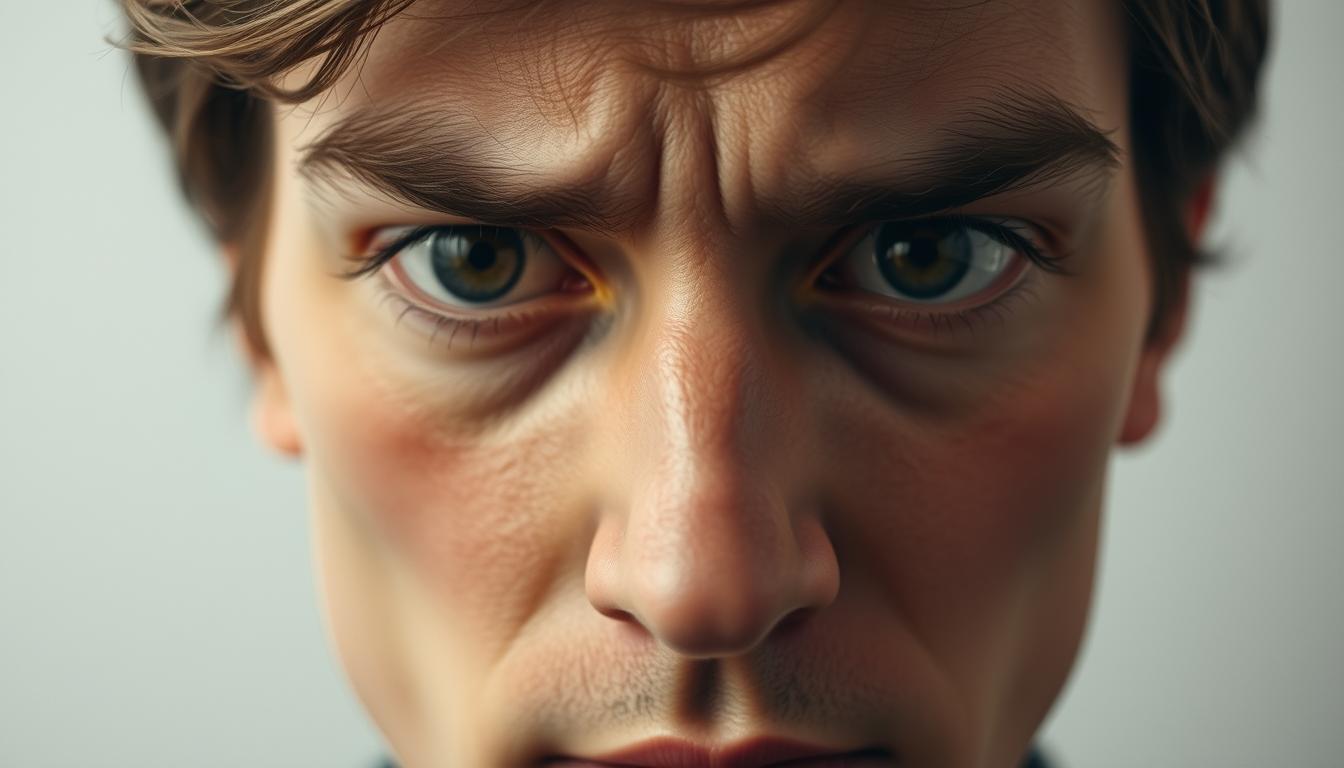I am a participant in the Amazon Services LLC Associates Program, an affiliate advertising program designed to provide a means for sites to earn advertising fees by advertising and linking to Amazon.com and affiliated sites. This post contains affiliate links. Privacy Policy
Anxiety’s Physical Effects: What You Need to Know
Ever felt your heart racing or your stomach churning in a stressful situation? You’re not alone. The link between your mind and body is strong. Anxiety can show up in ways that affect your health.
The mind-body connection is complex. Anxiety can cause a range of physical responses. This includes a fast heartbeat and tremors, which can be unsettling and debilitating if not treated.

It’s important to understand how anxiety affects physical health. Recognizing the physical signs of anxiety is the first step to addressing it. This can lead to relief and better overall well-being.
Best brain supplement!
Key Takeaways
- Anxiety can have a significant impact on your physical health.
- The mind-body connection plays a crucial role in anxiety’s physical effects.
- Recognizing physical symptoms of anxiety is key to managing them.
- Understanding anxiety symptoms can help you address the root causes.
- Managing anxiety requires a holistic approach to overall well-being.
Understanding the Mind-Body Connection
The mind and body are closely linked, affecting how we feel anxiety. When anxious, our brain sends signals to our body. This can cause physical symptoms.
How Your Thoughts Affect Your Physical Health
Your thoughts and feelings can harm your health. For example, anxiety triggers the “fight or flight” response. This releases stress hormones like cortisol and adrenaline.
These hormones get your body ready to face danger. You might feel your heart racing, sweat, or shake.
The Stress Response System
The stress response system, or HPA axis, kicks in when we feel threatened. It releases hormones to prepare us for action. But, too much stress can cause fatigue, sleep problems, and digestive issues.
Acute vs. Chronic Anxiety
It’s important to know the difference between acute and chronic anxiety. Acute anxiety is short-lived, while chronic anxiety lasts a long time. Chronic anxiety can harm your health, like causing heart disease or weakening your immune system.
The Cycle of Physical Symptoms and Anxiety
Anxiety can make physical symptoms worse, which in turn increases anxiety. For instance, worrying about a headache can make it worse. To stop this cycle, we need to tackle both the symptoms and the anxiety itself.
| Physical Symptoms | Anxiety-Related Causes |
|---|---|
| Rapid heartbeat, palpitations | Stress response, fear |
| Sweating, trembling | Adrenaline release, hyperventilation |
| Fatigue, insomnia | Chronic stress, HPA axis dysregulation |
“The mind is everything; what you think, you become.” – Buddha
Understanding the mind-body connection is key to managing anxiety. By seeing how our thoughts and feelings impact our health, we can start to break the anxiety cycle. This improves our overall well-being.
Can Anxiety Cause Physical Symptoms?
Anxiety can cause many physical symptoms. It affects your mental and physical health. Knowing how anxiety shows physically is key to managing it.
Common Physical Manifestations of Anxiety
Anxiety can show up in many ways, affecting your body. Some common symptoms include:
Cardiovascular Symptoms
Anxiety can make your heart beat fast and your blood pressure go up. This happens because your body goes into “fight or flight” mode, releasing stress hormones.
Digestive Issues
Anxiety can also cause stomach problems like nausea and pain. Stress slows down digestion, causing discomfort.
Respiratory Symptoms
You might breathe fast or feel like you can’t breathe. These symptoms come from your body’s stress response.
Muscle Tension and Pain
Muscle tension is common in anxiety, causing pain or stiffness. This is because your muscles are always tense due to anxiety.
| Physical Symptom | Possible Causes | Management Strategies |
|---|---|---|
| Rapid Heartbeat | Stress hormones, “fight or flight” response | Deep breathing, relaxation techniques |
| Digestive Issues | Slowed digestion due to stress | Dietary changes, stress management |
| Muscle Tension | Constant state of “high alert” | Exercise, relaxation techniques |
How to Recognize Anxiety-Related Symptoms
To know if your symptoms are from anxiety, look at when they happen. If they get worse when you’re stressed, they might be anxiety-related.
When Physical Symptoms Might Indicate Something Else
While anxiety can cause many symptoms, some might mean something else is wrong. If your symptoms are severe or last a long time, see a doctor to check for other health issues.
The Science Behind Anxiety’s Effects on the Body
Anxiety impacts your body in many ways, including your brain, hormones, and physical health. When you feel anxious, your body reacts through a complex system.
Neurological Pathways of Anxiety
Anxiety sets off certain brain pathways, like the amygdala and the prefrontal cortex. The amygdala deals with emotions and fear. The prefrontal cortex helps with thinking and decisions. When anxiety strikes, these areas don’t talk well together, causing an overreaction.
Hormonal Influences and the HPA Axis
The HPA axis is key in how your body handles anxiety. When you feel threatened, the HPA axis kicks in. It releases cortisol and adrenaline, getting your body ready to fight or flee. This can make your heart beat faster and your blood pressure go up.
Long-Term Physical Health Consequences
Long-term anxiety can harm your health. Stress hormones can cause high blood pressure, heart disease, and weaken your immune system. Anxiety can also lead to stomach problems and make other health issues worse.
Individual Variations in Anxiety Responses
Everyone reacts differently to anxiety. Things like your genes, life experiences, and how you cope can change how anxiety affects you. Knowing these differences helps in finding ways to manage anxiety better.
Understanding the science behind anxiety can help you deal with it. It lets you see your own experiences and take steps to manage your anxiety.
Managing Anxiety’s Physical Symptoms
Anxiety’s physical effects can be overwhelming. But, the right strategies can help you manage these symptoms and improve your well-being. It’s important to use both immediate relief techniques and long-term management strategies.
Immediate Relief Strategies
When anxiety hits, quick relief strategies can be a lifesaver. These methods calm your body and mind, reducing anxiety’s physical symptoms.
Immediate Relief Strategies
Having quick relief strategies is key. They help calm your body and mind, making anxiety’s symptoms less intense.
Breathing Techniques
Breathing techniques are very effective. Deep, slow breaths can slow your heart rate and reduce panic. Try inhaling for four counts, holding for four counts, and exhaling for four counts. Do this several times.
Grounding Exercises
Grounding exercises are also powerful. They help you focus on the present, distracting you from anxious thoughts. Try focusing on your feet on the ground or describing your surroundings in detail.
Progressive Muscle Relaxation
Progressive muscle relaxation involves tensing and relaxing muscles. Start with your toes and move up to your head, holding each muscle for a few seconds before releasing. This can reduce physical tension.
Lifestyle Changes for Long-Term Management
While quick relief is important, lifestyle changes offer long-term benefits. Regular exercise, a balanced diet, and enough sleep can all help reduce anxiety.
- Regular physical activity can reduce stress and anxiety.
- Eat a balanced diet with fruits, vegetables, and whole grains.
- Get enough sleep to regulate your mood and reduce anxiety.
Professional Treatment Options
If your anxiety is severe or affects your daily life, seek professional help. Mental health professionals can offer therapy, medication, or both to manage anxiety.
When to Seek Medical Help
Knowing when to seek medical help for anxiety is crucial. If you have severe symptoms like chest pain or trouble breathing, get help right away. For ongoing or severe anxiety, talk to a mental health professional.
Understanding Anxiety’s Physical Impact
Anxiety is not just a mental issue; it affects your body too. The way our thoughts and feelings show up physically is key. Recognizing this connection is the first step to better health.
Stress can make your heart race, cause tremors, and tighten muscles. These symptoms can be tough to handle. But, there are ways to ease them. Making lifestyle changes, using quick relief methods, and getting professional help can help.
It’s important to see that anxiety and physical symptoms are linked. By tackling anxiety, you can lessen its physical impact. Taking charge of your anxiety helps you manage stress better.
FAQ
Can anxiety cause physical symptoms that are similar to other serious health conditions?
Yes, anxiety can cause symptoms that look like other serious health issues. It’s important to see a doctor to get a correct diagnosis.
What are some common physical symptoms of anxiety?
Anxiety can cause heart problems like palpitations and chest pain. It can also lead to stomach issues like nausea and irritable bowel syndrome. Other symptoms include fast breathing and muscle tension, causing pain and stiffness.
How can I differentiate between anxiety-related physical symptoms and those caused by other health issues?
Think about when symptoms happen. If they get worse when you’re stressed or anxious, they might be anxiety-related. But, it’s always best to get a doctor’s opinion to be sure.
Can managing anxiety reduce its physical symptoms?
Yes, managing anxiety can help a lot. Techniques like breathing exercises, grounding, and progressive muscle relaxation can reduce symptoms. Making lifestyle changes can also help.
Are there any long-term physical health consequences of chronic anxiety?
Chronic anxiety can harm your health over time. It can lead to heart disease, stomach problems, and a weaker immune system, among other issues.
How does the mind-body connection play a role in anxiety’s physical effects?
The mind-body connection is key. It shows how our thoughts and feelings can affect our body. Anxiety is a great example of how our mental state can impact our physical health.
What are some immediate relief strategies for anxiety’s physical symptoms?
Quick ways to feel better include breathing exercises, grounding, and progressive muscle relaxation. These can help with fast heartbeat, shaking, and muscle tightness.
When should I seek medical help for anxiety-related physical symptoms?
If you’re not sure what’s causing your symptoms, or if they’re severe, see a doctor. They can help figure out what’s wrong and create a treatment plan.
I am a participant in the Amazon Services LLC Associates Program, an affiliate advertising program designed to provide a means for sites to earn advertising fees by advertising and linking to Amazon.com and affiliated sites. This post contains affiliate links. Privacy Policy


